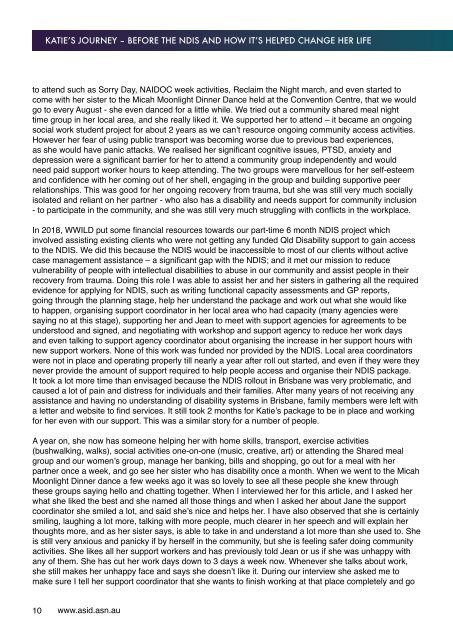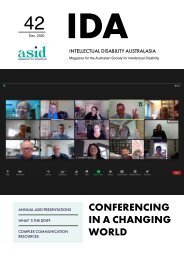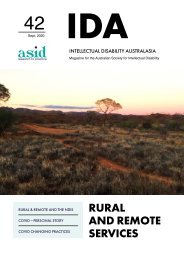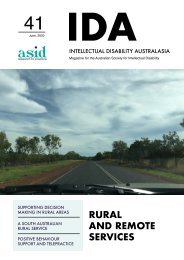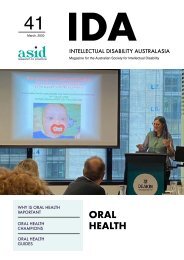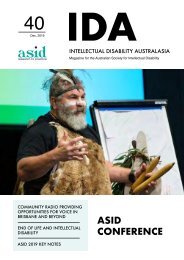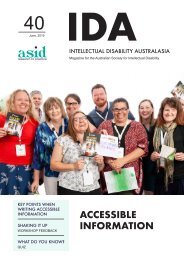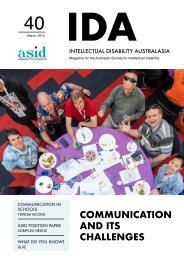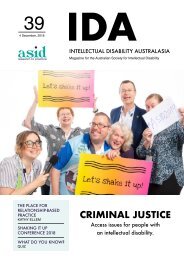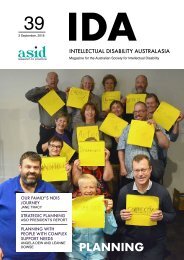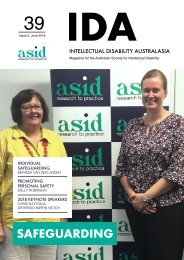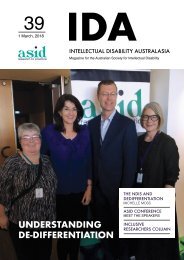IDA Magazine Vol 40 Iss 3 (Sep 2019)
- No tags were found...
You also want an ePaper? Increase the reach of your titles
YUMPU automatically turns print PDFs into web optimized ePapers that Google loves.
KATIE’S JOURNEY – BEFORE THE NDIS AND HOW IT’S HELPED CHANGE HER LIFE<br />
to attend such as Sorry Day, NAIDOC week activities, Reclaim the Night march, and even started to<br />
come with her sister to the Micah Moonlight Dinner Dance held at the Convention Centre, that we would<br />
go to every August - she even danced for a little while. We tried out a community shared meal night<br />
time group in her local area, and she really liked it. We supported her to attend – it became an ongoing<br />
social work student project for about 2 years as we can’t resource ongoing community access activities.<br />
However her fear of using public transport was becoming worse due to previous bad experiences,<br />
as she would have panic attacks. We realised her significant cognitive issues, PTSD, anxiety and<br />
depression were a significant barrier for her to attend a community group independently and would<br />
need paid support worker hours to keep attending. The two groups were marvellous for her self-esteem<br />
and confidence with her coming out of her shell, engaging in the group and building supportive peer<br />
relationships. This was good for her ongoing recovery from trauma, but she was still very much socially<br />
isolated and reliant on her partner - who also has a disability and needs support for community inclusion<br />
- to participate in the community, and she was still very much struggling with conflicts in the workplace.<br />
In 2018, WWILD put some financial resources towards our part-time 6 month NDIS project which<br />
involved assisting existing clients who were not getting any funded Qld Disability support to gain access<br />
to the NDIS. We did this because the NDIS would be inaccessible to most of our clients without active<br />
case management assistance – a significant gap with the NDIS; and it met our mission to reduce<br />
vulnerability of people with intellectual disabilities to abuse in our community and assist people in their<br />
recovery from trauma. Doing this role I was able to assist her and her sisters in gathering all the required<br />
evidence for applying for NDIS, such as writing functional capacity assessments and GP reports,<br />
going through the planning stage, help her understand the package and work out what she would like<br />
to happen, organising support coordinator in her local area who had capacity (many agencies were<br />
saying no at this stage), supporting her and Jean to meet with support agencies for agreements to be<br />
understood and signed, and negotiating with workshop and support agency to reduce her work days<br />
and even talking to support agency coordinator about organising the increase in her support hours with<br />
new support workers. None of this work was funded nor provided by the NDIS. Local area coordinators<br />
were not in place and operating properly till nearly a year after roll out started, and even if they were they<br />
never provide the amount of support required to help people access and organise their NDIS package.<br />
It took a lot more time than envisaged because the NDIS rollout in Brisbane was very problematic, and<br />
caused a lot of pain and distress for individuals and their families. After many years of not receiving any<br />
assistance and having no understanding of disability systems in Brisbane, family members were left with<br />
a letter and website to find services. It still took 2 months for Katie’s package to be in place and working<br />
for her even with our support. This was a similar story for a number of people.<br />
A year on, she now has someone helping her with home skills, transport, exercise activities<br />
(bushwalking, walks), social activities one-on-one (music, creative, art) or attending the Shared meal<br />
group and our women’s group, manage her banking, bills and shopping, go out for a meal with her<br />
partner once a week, and go see her sister who has disability once a month. When we went to the Micah<br />
Moonlight Dinner dance a few weeks ago it was so lovely to see all these people she knew through<br />
these groups saying hello and chatting together. When I interviewed her for this article, and I asked her<br />
what she liked the best and she named all those things and when I asked her about Jane the support<br />
coordinator she smiled a lot, and said she’s nice and helps her. I have also observed that she is certainly<br />
smiling, laughing a lot more, talking with more people, much clearer in her speech and will explain her<br />
thoughts more, and as her sister says, is able to take in and understand a lot more than she used to. She<br />
is still very anxious and panicky if by herself in the community, but she is feeling safer doing community<br />
activities. She likes all her support workers and has previously told Jean or us if she was unhappy with<br />
any of them. She has cut her work days down to 3 days a week now. Whenever she talks about work,<br />
she still makes her unhappy face and says she doesn’t like it. During our interview she asked me to<br />
make sure I tell her support coordinator that she wants to finish working at that place completely and go<br />
10 www.asid.asn.au


